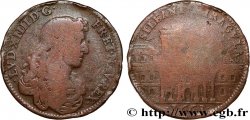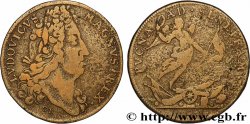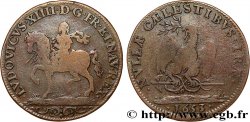fjt_049456 - LOUIS XIV LE GRAND ou LE ROI SOLEIL Prise de Luxembourg 1684
Nicht verfügbar.
Artikel auf unserem Online-Shop verkauft
Preis : 57.93 €
Artikel auf unserem Online-Shop verkauft
Preis : 57.93 €
Type : Prise de Luxembourg
Datum: 1684
Metall : Kupfer
Durchmesser : 41 mm
N° im Nachschlagewerk :
Vorderseite
Titulatur der Vorderseite LUDOVICUS MAGNUS REX CHRISTIANISSIMUS.
Beschreibung Vorderseite Buste de Louis XIV à droite, signé J. MAVGER. F.
Übersetzung der Vorderseite Louis le Grand, roi très chrétien.
Rückseite
Titulatur der Rückseite SECURITAS PROVINCIARUM.
Beschreibung Rückseite La Ville de Luxembourg, sous la figure d’une femme vêtue à l’antique, assise sur un rocher, tenant une couronne murale et appuyée sur l’écusson de la ville. A gauche un trophée d’armes ; à l’exergue : LUCEMBURGUM CAPTUM / M. DC. LXXXIV.
Kommentare
Le siège de forteresse de Luxembourg dura trois mois, du 28 avril au 4 juin 1684. Les troupes françaises étaient commandées par le maréchal de Créqui, le fameux Vauban dirigeait les attaques lui-même. En raison de la bravoure avec laquelle la garnison espagnole avait défendu la place, un départ honorable lui fut accordé lors de la capitulation. Louis XIV fit son entrée à Luxembourg trois ans plus tard où il séjourna pendant cinq jours. Le Luxembourg resta province française jusqu’en 1697, date de la signature de la paix de Ryswick qui rendit le Luxembourg à l’Espagne.
The siege of the fortress of Luxembourg lasted three months, from April 28 to June 4, 1684. The French troops were commanded by Marshal de Créqui, the famous Vauban himself led the attacks. Due to the bravery with which the Spanish garrison had defended the place, they were granted an honorable departure upon surrender. Louis XIV entered Luxembourg three years later, where he stayed for five days. Luxembourg remained a French province until 1697, when the Peace of Ryswick was signed, which returned Luxembourg to Spain.
The siege of the fortress of Luxembourg lasted three months, from April 28 to June 4, 1684. The French troops were commanded by Marshal de Créqui, the famous Vauban himself led the attacks. Due to the bravery with which the Spanish garrison had defended the place, they were granted an honorable departure upon surrender. Louis XIV entered Luxembourg three years later, where he stayed for five days. Luxembourg remained a French province until 1697, when the Peace of Ryswick was signed, which returned Luxembourg to Spain.








 Berichten über einen Fehler
Berichten über einen Fehler Die Seite drucken
Die Seite drucken Teilen meiner Auswahl
Teilen meiner Auswahl Stellen Sie eine Frage
Stellen Sie eine Frage Einlieferung/Verkauf
Einlieferung/Verkauf
 Details
Details









